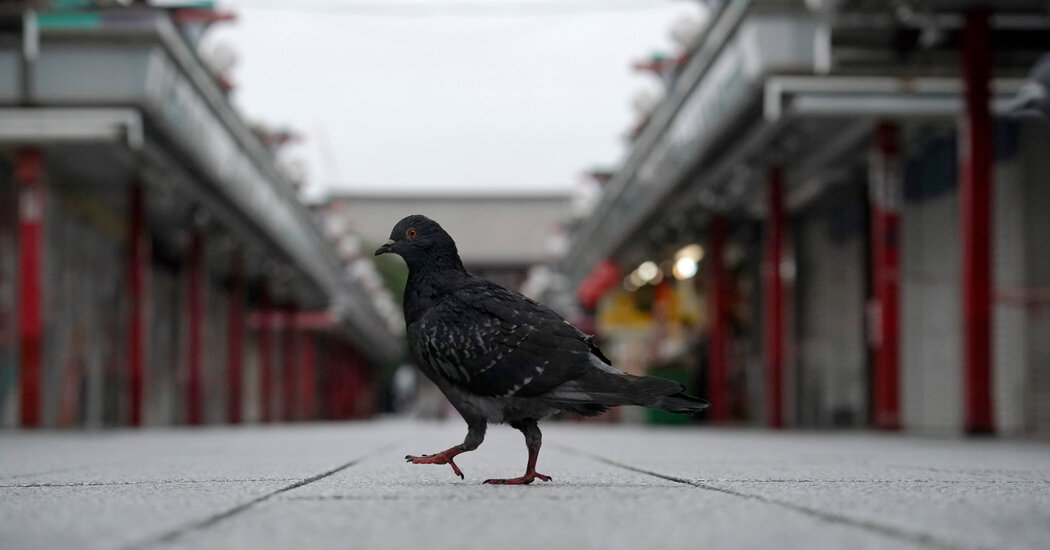Often seen as disease-carrying nuisances, pigeons have an image problem around the world.
Japan is no exception, but the birds enjoy some legal immunity, forcing city dwellers to put up with these unwanted guests roosting and cooing on their balconies.
Under Japan’s wildlife laws, residents may not kill or remove even the peskiest of birds without approval from the local authorities, a protection that feral pigeons do not have at the national level in the United States, though some states including Massachusetts have rules against killing them. If people discover that a pigeon has laid an egg or made a nest on their balcony, they cannot remove the bird, nest or egg without approval either.
And drivers are supposed to drive slowly while pigeons cross the road, even against the light.
Now, the lowly pigeon now finds itself at the center of a case after a Tokyo taxi driver is accused of deliberately running one down with his cab.
The 50-year-old driver was arrested Dec. 3 and charged with violating the wildlife protection law but has not been indicted. The police said he had accelerated after a traffic light turned green, deliberately plowing his taxi into a flock of pigeons at a speed of about 35 miles per hour, killing one, according to The Mainichi, a local newspaper.
An autopsy was ordered. The veterinarian who performed it determined that the pigeon had died of traumatic shock.
The taxi driver could not be reached for comment. The police told the Kyodo News that he told them, “Roads belong to humans, so pigeons should have dodged out of the way.”
Under the wildlife law, feral pigeons are not distinguished from other wild birds and can be killed only if they are proven to be a problem, such as by carrying disease, or damaging crops or livestock.
Even then, the local authorities must give permission to kill them.
The penalty for killing a pigeon without permission is up to a year in jail or a fine of a million Japanese yen, which is about $7,000. In both 2021 and 2022, about 4,000 pigeons were killed with that permission. About 200 eggs were removed in both years.
Because of the law, apartment complexes have had to find other ways to deal with the nuisance.
Some complexes opt to scare away the birds by hiring falconers, who work under permits, to bring hawks at a cost of thousands of dollars per visit to spook the pigeons.
Falconers who have a hunting license are also allowed to trap pigeons and kill them.
They are kept busy, given the large numbers of pigeons nesting on balconies that keep people awake at night. “Some people really hate it,” said Keisuke Ikoma, who runs a falconry company called Green Field.
His company, which is based in Osaka and operates across Japan, dispatches falconers to 3,000 to 4,000 locations a year. In addition to apartment complexes, customers include the owners of factories who are concerned about pigeon droppings damaging their products.
Legal experts said that the arrest of the taxi driver appeared to be less about the fate of the single pigeon and more about the social harm caused by the deliberate decision to kill a living creature.
“The driver drove over a pigeon at a high speed,” said Kazuaki Ishii, a lawyer in Kyoto who specializes in pet and animal rights. “which violates the social order that the wildlife protection and management act aims to protect.” Atsushi Hosokawa, an animal rights lawyer, said the police appeared to see someone who would run over any animal at 35 m.p.h. as a danger to society at large. It is up for discussion whether the police’s actions were commensurate with the seriousness of the allegation, he added.
Japan’s wildlife law was originally designed to prevent the over-hunting of wild animals. In recent years, certain pest species including deer and boar have been designated for culling. In 1981, the authorities considered adding feral pigeons but did not do so because they were concerned that they would be indistinguishable from pigeons raised for racing.
The taxi driver has garnered some sympathy on social media.
“I just don’t understand why the police tried so hard,” one user wrote of the arrest on X, formerly Twitter. “It’s so mysterious.”
